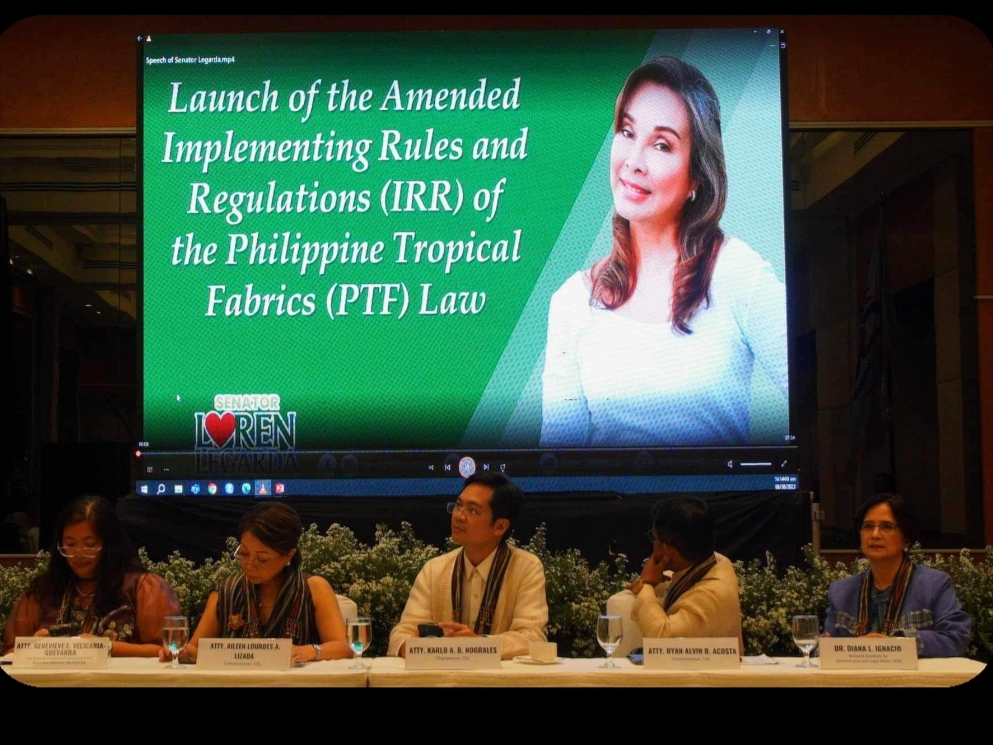
QUEZON CITY – The Amended Implementing Rules and Regulations (IRR) of Republic Act No. 9242, otherwise known as the “Philippine Tropical Fabrics (PTF) Law”, was launched on Wednesday, August 30 in Eastwood Richmonde Hotel in this city and will take effect on Sept. 1, 2023.
Senator Loren B. Legarda was the principal author of the PTF Law during her first term as senator.
In his speech, CSC Chairperson Karlo Alexei B. Nograles said that the Philippine Tropical Fabrics Law is a notable and game-changing law.
Nograles noted that over the past two decades and despite the Covid-19 pandemic, the Technical Working Group (TWG) continued their work in finetuning the amendments in the IRR of RA 9242.
The Department of Science and Technology (DOST), Department of Trade and Industry (DTI) and the Department of Agriculture (DA) are now members of the Inter-Agency Technical Working Group (TWG).
The amended IRR was published in the Philippine Star on August 17, 2023, thus, the law will be effective on Sept. 1, 2023.
The CSC enjoined the government officials and employees to patronize and use the local textiles and fabrics as provided by law.
Nograles expressed gratitude to the CSC officials who contributed in the crafting of the Amended IRR.
The Amended IRR only provides for casual and official uniforms of government employees.
However, the healthcare workers are not covered by the PTF Law although they are also civil servants.
The CSC chief also thanked the private stakeholders who aso helped in the crafting of the Amended IRR of RA 9242 and in the propagation of the local fabrics industry.
He urged the civil servants to patronize the country’s local fabrics to be used in their respective office uniforms.
According to Nograles, the law was implemented in 2004 with the original IRR but with its implementation, the challenges came out and had to be addressed which prompted the crafting of the Amended IRR.
“It will push for the revival of the abaca industry and will create more employment for farmers and job generation in the fabric industry,” he said.
“After its effectivity on Sept.1, the CSC will come up with issuances for the full implementation of the law in all government agencies,” he added.
The supply aspect of the law will be the responsibility of the Department of Science and Technology-Philippine Textile Research Institute (DOST-PTRI). The DA-PhilFiDA (Philippine Fiber Industry Authority) will take care of fabrics industry supply and the DTI will be in charge of the manufacturing sector.
The raw supplies of the local farmers will go to the textiles industry such that to have more economic development, we have to take care of the local economy.
For his part, Dr. Julius L. Leano Jr., Director IV of the DOST-PT|RI, said that banana and pineapple fibers are byproducts and they are now in the byproduct utilization stage of fibers which are climate resistant
“A developmental work will be provided to the fiber industry through science innovation which must be creative and transcend whatever are the predicaments in the textile industry,” he added.
Atty. Ariel G. Ronquillo, Assistant Commissioner of the CSC, expounded on the salient provisions of the amended IRR of the PTF Law such as pursuant to Section 5 of RA 9242, it’s the State policy to instill patriotism and nationalism, among others.
The PTF Law covers all government officials and officials, whether regular, appointive or elective, Government Owned or Controlled Corporations (GOCCs), local government units, State universities and colleges.
The Natural Textile Fiber (NTF) and Philippine Tropical Fabrics (PTF) are tested in compliance with the law.
The use of PTF is used as official uniforms of government officials and employees, which is set of uniforms, or a part of set, but not as mere clothing embellishment or adornment.
Standards and certification for PTF such that at least 5% Procurement Procedure Adoption of the procurement procedures in RA No. 9184 or the “Government Procurement Reform Act”. Certification from Dost-pnri. Implementation, monitoring, and evaluation Responsibilities Issue the certificate of non-availability of supply of PTF Csc Release and disseminate issuance that will ensure government agencies comply with the provisions of the law. Da – PhilFiDA.
It also provides for the Responsibility and Accountability of Heads of Agencies, as well as Responsibilities for implementation of RA No. 9242.
In her video message, Legarda noted that if the office uniforms made of PTF would be used for five years, would mean a gross income of P15 million for the government.
The 100 % usage of PTF would be expensive but that’s the requirement of the law.
She expressed the hope for the full implementation of the law.
For her part, Atty. Aileen Lourdes A. Lizada, Commissioner of the CSC, was elated with the truthful and fruitful launching of the Amended IRR of RA 9242.
“We look forward to a more dynamic workforce in the government,” Lizada said.
“Preferential treatment of PTF would contribute to a more competitive fabrics industry. It will instill patriotism and nationalism with the PTF Law,” she added.
On the other hand, the DOST can fund researches in the state universities concerning the fiber industry.
The bottom line of all of this is to be the catalyst of increasing demand or drive up the demand for PTF, which may even introduce more resilient fabric industry. – By Perfecto T. Raymundo, Jr.


